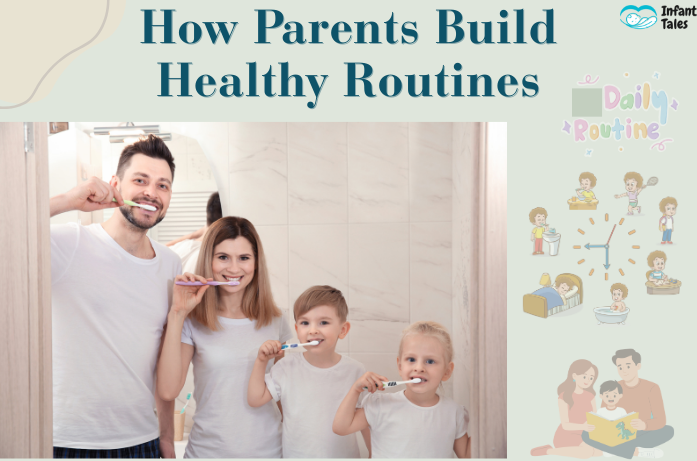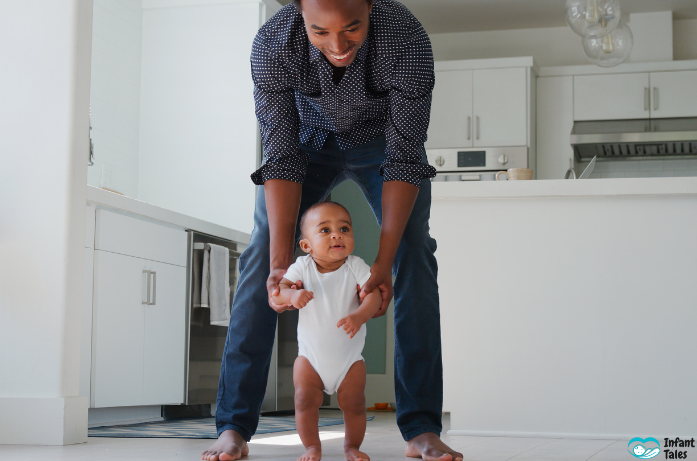By Infant Tales Team
Childbirth brings with it a new phase in life, full of pleasure, love, and new responsibilities. A parent wants nothing else but for their child to make the best possible entry into life, and a strong way to do that is through healthy routines.
The routine may be something simple, like brushing your teeth before bed or having meals with the family, but as you grow up, these little things can have a huge impact on your child’s development. Routines inject balance, structure, and spontaneity into daily life. More than that, they give children a sense of security, empowering them to become confident, assertive, and healthy individuals.
In this guide, we will discuss why Parents Build Healthy Routines, how one builds them step-by-step, and how these small daily rituals make a huge difference in raising joyful and healthy children.
why Parents Build Healthy Routines Matter
Children thrive when life feels known and predictable. It is the little things: bedtime stories or breakfast that begins at the same time every day since that structure and consistency makes a child feel safe and loved.
Healthy routines act as skeletal systems for the day that give underdeveloped kids a sense of security. Some research done by the American Academy of Pediatrics (AAP) suggests that consistent parenting routines for toddlers and young children can help with:
- Sleep quality: for helping kids go to sleep sooner and stay asleep longer.
- Eating habits: for encouraging better nutrition and healthy weight.
- Cognitive growth: activities associated with better concentration, learning, and readiness for school.
Children develop feelings of calm, less anxiety and more cooperation from knowing what is coming next. Routines do not mean rigid rules; rather, it is about love, stability and rhythm that nurture a child’s well-being.
Morning Routines: Starting the Day Right
A child’s morning usually sets the tone for the entire day. A good morning routine will make children feel energized, calm, and ready to learn.
These are simple habits to employ from the parents side:
- Wake up at the same time every day: keeps the internal clock balanced.
- Healthy breakfast matters: having fruits, whole grains, and proteins for nourishment in schools or for playground activities.
- Stress-free mornings: allow for packing brushing teeth, changing clothes, and searching for the other shoe.
- Start with positivity: a hug, a smile, or a cheerful “Good morning” can set the right mood.
Parenting tip: Research has shown that children who keep regular morning routines tend to be better focused and ready to absorb new concepts at school.
Mealtime Routines: Nourishment Beyond Food
Mealtimes are about much more than simply eating-they are also moments of connection. When families share mealtimes, children feel part of the family, feel special, and are more willing to discuss whatever is on their minds.
This is what healthy mealtime habits usually look like:
- Sharing meals if at all possible, even once per day.
- Providing balanced meals with vegetables, fruit, protein, and grains.
- Avoiding screens during dinner to allow time for an interesting conversation.
- Allowing kids to decide when they’re full instead of insisting that they “finish everything.”
According to the Harvard T.H. Chan School of Public Health, family meals contribute to children developing healthier eating patterns and reduce the risk of obesity.
In parenting, a good suggestion is to use mealtime as storytelling time. Asking your children, “What was the best part of your day?” can really spark meaningful conversation.
Bedtime Routines: The Secret to Better Sleep
Sleep is as important to a child as food and play. A child who gets enough rest is happier, healthier and learns better. A good bedtime routine calms the mind and tells it that rest is the next step.
Some good calm activities to do during bedtime can be:
- A fixed bedtime that stays the same even on weekends.
- Relaxing activities like a bath, soft music, or reading together.
- No screens at least an hour before bed (blue light may disrupt sleep).
- Comfort items like a soft blanket, nightlight or even a stuffed toy.
The National Sleep Foundation confirms that kids falling asleep faster with bedtime routines actually experience better moods during the day.
Parenting tip: Give your child a “bedtime ritual,” such as picking out clothes for tomorrow or sharing thoughts of gratitude.
Play and Learning Routines
Children learn best through play, but if learning activities become part of their daily routine, they become naturally integrated into their week and become fun.
Some examples of play and learning routines:
- Daily reading time: any kind of story really helps develop imagination and vocabulary in those 10 minutes.
- Outdoor play: climbing, running, biking for motor skills development and stress relief.
- Screen time balance: less than one hour per day, 2–5 age range, recommended by AAP, preferably educational shows.
- Creative activities: puzzles, drawing, music, or pretend play invigorate creative problem-solving.
Rather than asking, “Do you want to read?” ask the child, “Which story should we read today?” Allowing children to make a choice makes routines more enjoyable for them.

Health and Hygiene Routines
Ultimately, good hygiene becomes a matter of reflex after an action has been set in the daily routine. Parents can make it easy and fun:
- Wash hands: before eating, after playing, and after using the bathroom.
- Dental care: brushing with fluoride toothpaste in the morning and at night.
- Doctor visits: keeping up with check-ups and immunizations.
- Cleanliness + fun: there’re songs, stickers, or reward charts to celebrate hygiene habits.
In fact, the Centers for Disease Control and Prevention give parents great information on how to keep their children healthy through simple hygiene practices.
Emotional Routines: Building Inner Strength
Children do not need routines for just the body but also for the heart. Emotional habits help children feel loved, safe, and understood.
Building emotional routines includes:
- Daily check-ins: ask, “How are you feeling today?” to give time for expression.
- Moments of thanks: Share one thing they’re thankful for to build positivity.
- Affection rituals: Hugs before school and kisses goodnight or simply saying I love you.
- Consistent discipline: setting boundaries keeps children secure while teaching them responsibility.
Parenting tip: Create a feelings chart with emojis and have your child point to how they feel each day.
Staying Consistent in Parenting
Consistency is a big issue, although it doesn’t necessarily matter. Children thrive when routines are followed consistently.
How to stay on track:
- Start easy; do not try to set five new routines at once.
- Involve your children; allow them to choose their pajamas, pick their bedtime story, or help set the table.
- It is a good idea to put adaptability ahead of a strict approach; therefore, if for any reason, they ever get disrupted, you can gently restart without any pressure.
- Practice what you preach; children do more copying of what they see than what they hear.
Common Challenges and Solutions
All families encounter obstacles. From the following, see the common struggles and ways to solve them:
- Kids resisting routines: Keep them fun with songs, games, or rewards.
- Busy schedules: Adapt routines to fit your lifestyle; shorter but consistent are better than none.
- Inconsistency: Don’t be discouraged; start again without guilt or remorse.
- Different parenting styles: Communicate with partner or other caregivers to keep routines consistent.
FAQs
1. Why are routines important for kids?
Well, to provide structure, to give security, and to nurture proper development.
2. What is a simple bedtime routine?
Bath time, storytime, and then closing the lights at the same time every night.
3. How can routines be entertaining?
Perhaps by singing a routine song, making a routine game, or letting kids make small choices.
4. What if my child resists routines?
Just stay peaceful and consistent, and try putting in some playful spirit.
5. Can a busy family even have routines?
Sure, habits as little as sitting down for a shared meal or a bedtime hug constitute great routine building blocks.
Final Thoughts
From a healthy-again to-usual routine, you could say there is a hidden backbone function in family life; they bring down stress while initiating good habits between themselves and forged lovely bonding moments. More importantly, routines prepare kids for life when children gain discipline, instilling in them patience and self-care.
No one expects you to be perfect; in fact, it’s okay for you to be far from perfect. Start with small tracks: a hug in the morning, bedtime stories, shared family meals. As time passes, these seemingly little things pull together into solid bases to elevate joyful, confident kids.
Most importantly, on the very best of days, routines are provided a little love and a lot of flexibility.
For more guides on parenting and child care, follow Infant Tales and check out our latest articles.
Disclaimer
The article is only meant to serve the educational purpose. It should not replace medical professional advice. Please consult your child’s pediatrician or healthcare provider for questions about his or her health, nutrition, sleep, or development.



